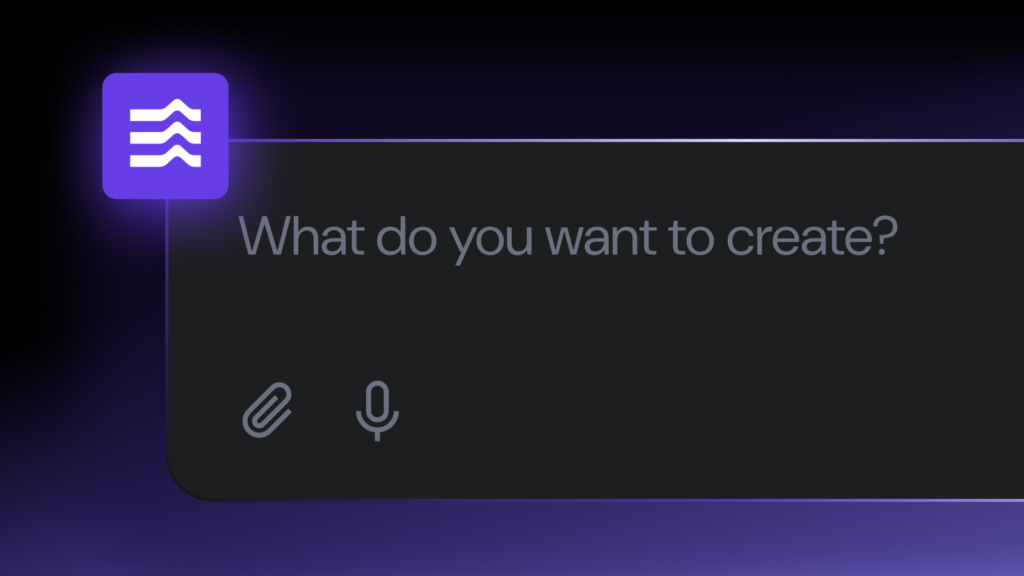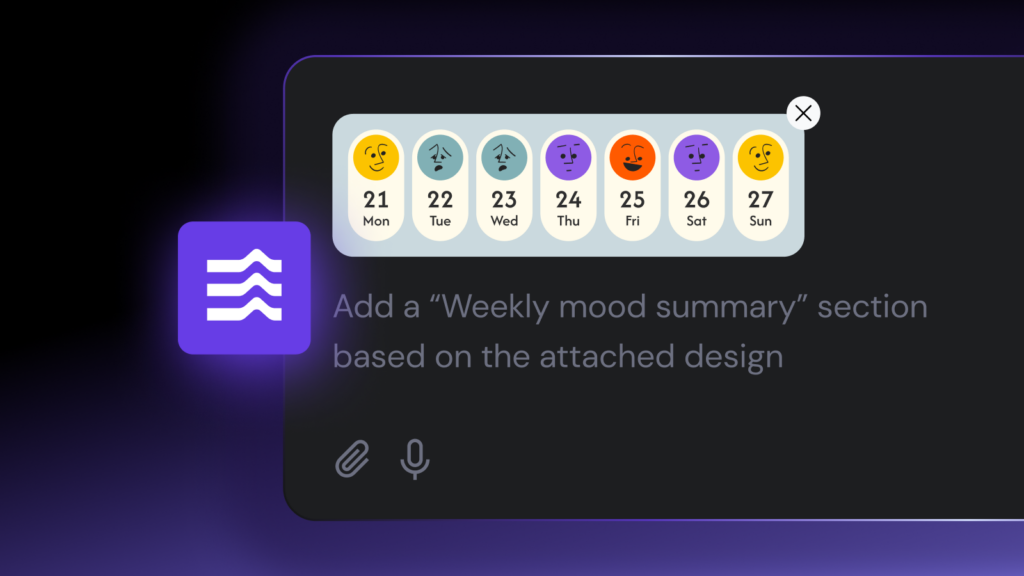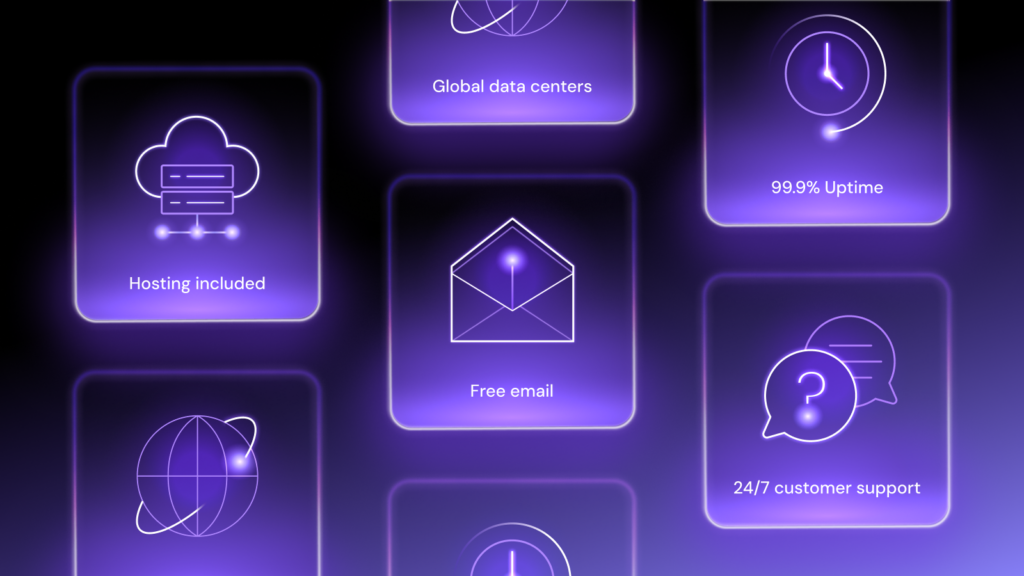Micro SaaS ideas to make money in 2025
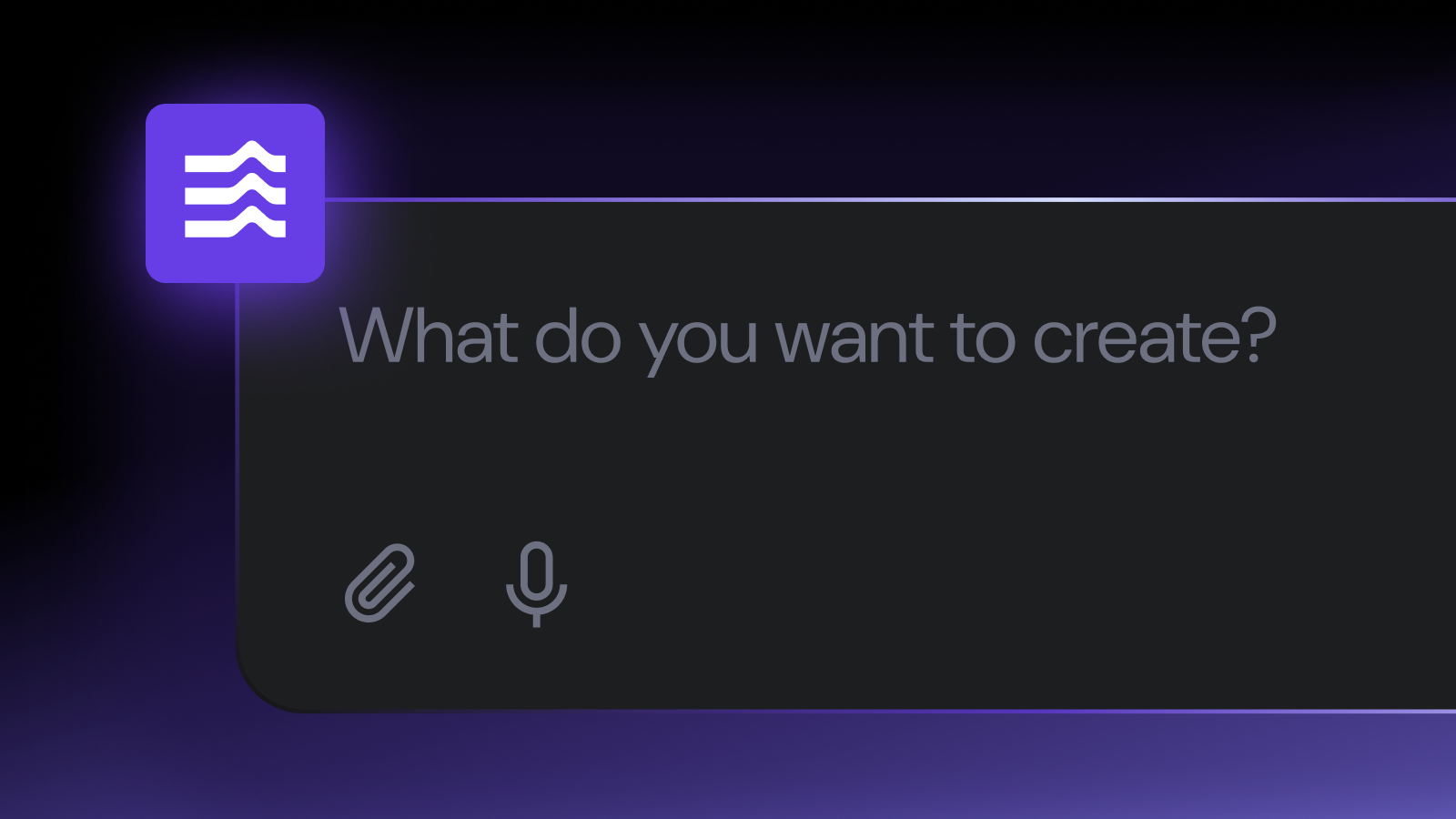
A micro SaaS is a small, niche software as a service product ‒ like a scheduling tool, a simple CRM, or a customer feedback widget. Unlike traditional SaaS platforms, it focuses on one feature or solves a very specific problem for a niche audience.
What makes micro SaaS so popular now is its low overhead and high potential. Solopreneurs, startups, and indie hackers are jumping on the trend because you don’t need a big team or huge funding to launch something useful. In many cases, a single developer or founder can build, run, and grow a micro SaaS business on their own.
And the best part? It can actually make money.
Keep reading as we have compiled 10 profitable micro software as a service ideas that are simple, scalable, and ready to build with no-code platforms.
Why micro SaaS is a great idea for a startup
Micro SaaS is a good idea for a startup because it’s one of the simplest ways to build a lean, profitable business around a specific problem. From a simple online appointment scheduler to a tool that collects customer feedback, micro SaaS products can be profitable, scalable, and relatively easy to maintain.
You don’t need to create a complex platform, as a single piece of specialized software can be enough if it addresses the pain point. With automation tools, even non-developers can build a micro SaaS product quickly ‒ no coding involved.
The business model is also appealing. With recurring revenue, low overhead, and limited complexity, micro SaaS often brings in high profit margins. That makes it a great fit for solo founders and small teams looking for long-term results without a huge upfront investment.
10 best micro SaaS product ideas
There are many great SaaS ideas, but the best ones solve a real problem in a simple way. If you want to start your own product, here are some micro SaaS opportunities to explore. We’ll throw in micro SaaS examples from different niches to help you gauge their potential.
Once you’ve found the right idea, check out our guide on how to build a micro SaaS to bring it to life.
AI-powered content tools
These tools help users generate content faster by using machine learning models to write text, create images, or repurpose content based on short prompts. They’re especially useful for creators, marketers, and small business owners who want to save time and effort.
Blog post generator
A tool to create full blog post drafts just by entering a topic, target keywords, and choosing the tone they want. It would generate the structure for them ‒ intro, headings, and a conclusion ‒ and even suggest images if needed.
Ideally, creators could tweak the length, rephrase certain parts, and export the final version to DOCX, PDF, or directly into a CMS like WordPress. The interface should be simple and easy to use so even non-technical users can navigate it easily.
Content repurposing tool
Repurposing content might sound easy, but it can be time-consuming. This tool would address this bottleneck by converting one piece of content into multiple formats, like a LinkedIn post or even a short video script.
Marketers could choose the output format, set the tone or style, and then review or tweak the results before exporting. Add image generation to ensure each copy is unique.
Product description generator
This SaaS product helps store owners speed things up by generating clear, unique descriptions based on product details.
Sellers would upload a spreadsheet or paste basic info like product name, category, and key features. The tool would then generate descriptions in bulk, with options to set the tone and adjust the length.
Educational micro SaaS
These tools aim to make educational content accessible and easier to follow. They’re popular with tutors, course creators, and small training companies looking to offer flexible, personalized learning experiences without building a full learning management system (LMS).
Mini course builder
An app for creating bite-sized courses in a few clicks. Key features like course previews and progress tracking can help drive subscriptions and gamify the learning experience.
Allow tutors to upload images or generate them with AI to make the content more engaging. Add a leaderboard with sharing options to gamify the experience.
Tutors who want to monetize their work should be able to integrate the tool with popular payment options like Stripe or PayPal. Include video upload support for more interactive courses.
Did you know?
You can integrate a Hostinger Horizons web app with Stripe to accept payments.
Language learning tool
An app designed to help users practice vocabulary, grammar, or conversation in a specific language. It could offer daily challenges, flashcard decks, pronunciation tips, and short quizzes to make the learning experience feel fun and consistent.
Adding gamified progress tracking, streaks, and spaced repetition can boost engagement. For extra value, customize it with additional features for niche audiences, like travelers and language test takers.
Take a look at our guide on how to build a language learning web app using Hostinger Horizons to brainstorm your own version. Use our free trial to experiment risk-free.

Certificate generator
A tool to create and send professional-looking certificates with personalized details like student name, course title, and completion date.
Tutors could choose from ready-made templates, customize branding, and download or email certificates in one click. Include options to add instructor signatures, add QR codes for verification, or track certificate views and downloads for completion stats.
Micro project management tools
- Estimated build time: 3-4 weeks
- Support needed: No-code platforms can handle core features, with developers needed for advanced logic, collaboration tools, or integrations.
Individuals and small teams can use these tools to stay organized without the complexity of traditional project management software. They’re ideal for freelancers, startups, and remote teams looking for a simple way to track progress and manage tasks online.
Simple task tracker
A lightweight tool to create tasks, set deadlines, and mark progress. An app like this is great for freelancers or independent business owners managing client projects or personal workflows.
Add features like drag-and-drop task boards, progress indicators, and optional due date reminders. You could also offer visual themes or templates for different types of users, from content creators to developers.
Team collaboration planner
Designed for small remote teams, this tool lets users assign tasks, add comments, and set shared goals. It should come with a shared calendar view, real-time updates, and basic notification settings for productive collaboration.
Other useful features to consider include time tracking for tasks and a weekly overview to help teams plan ahead. Integration with Slack, Trello, or Notion could also be a valuable add-on.
Personal goal planner
Not all productivity tools need to be business-focused. This one can help users set and track personal goals ‒ from fitness to side projects ‒ with progress charts and daily reminders.
You could also include habit tracking, goal categories, motivational quotes, or journal entries, depending on the purpose or niche. A clean mobile-first design would make it easy to update goals on the go.
Want to build something like this? Our guide on how to create a task manager web app is a great starting point to shape your own idea.
Did you know?
When using a no-code app builder, the output mostly comes down to the prompts you put in. Learn how to write effective prompts for Hostinger Horizons with our guide.
Niche CRMs
- Estimated build time: 4-6 weeks
- Support needed: No-code tools and database platforms work for basic versions, but advanced features like integrations, automation, and role-based access might need developer support.
While general customer relationship management (CRM) software often feels bloated for smaller teams or specific industries, niche CRMs can solve that by focusing only on the features a certain group actually needs. They cater to professionals or businesses that want a lightweight, easy-to-use tool tailored to their workflow.
CRM for freelancers
A CRM app like this would be ideal for copywriters, designers, developers, and consultants who juggle multiple clients. It could manage client communications, project status, and invoicing in one place.
The software should include essentials like a client list, project notes, task deadlines, and follow-up reminders. To make it more valuable, you could add a built-in proposal generator, contract templates, or time tracking.
CRM for real estate agents
A specialized CRM can help real estate agents and property owners manage listings, schedule viewings, and track client interactions. Features like lead status tags, follow-up reminders, and a shared calendar view help keep the workflow organized and easy to follow.
Extra features to consider include email templates for buyer and seller updates, a document storage space, and filters for sorting contacts by buying stage or property interest.
CRM for coaches or consultants
Designed for one-on-one or group coaching businesses, this CRM should allow users to organize leads, session notes, and follow-ups. It could benefit from having automated onboarding sequences, scheduling links, and a simple dashboard to track client progress.
You can add goal-setting features, personalized check-ins, and integration with video call platforms like Zoom or Google Meet to improve engagement and make the tool more accessible.
Micro SaaS for fitness
Fitness-focused micro SaaS products are great for creators, trainers, and wellness brands who want to offer personalized experiences. Whether it’s workout planning, progress tracking, or community support, users are looking for tools that help them stay consistent and motivated.
Custom fitness app
A personalized fitness app can help users track workouts, log progress, and follow tailored routines based on their fitness goals. Trainers could offer custom plans, video instructions, and nutrition tips ‒ all inside a single dashboard.
In our guide on creating a fitness web app, we focused on keeping the interface simple to make logging workouts quick and effortless. Check out Fitness Tracker by Hostinger Horizons for inspiration.
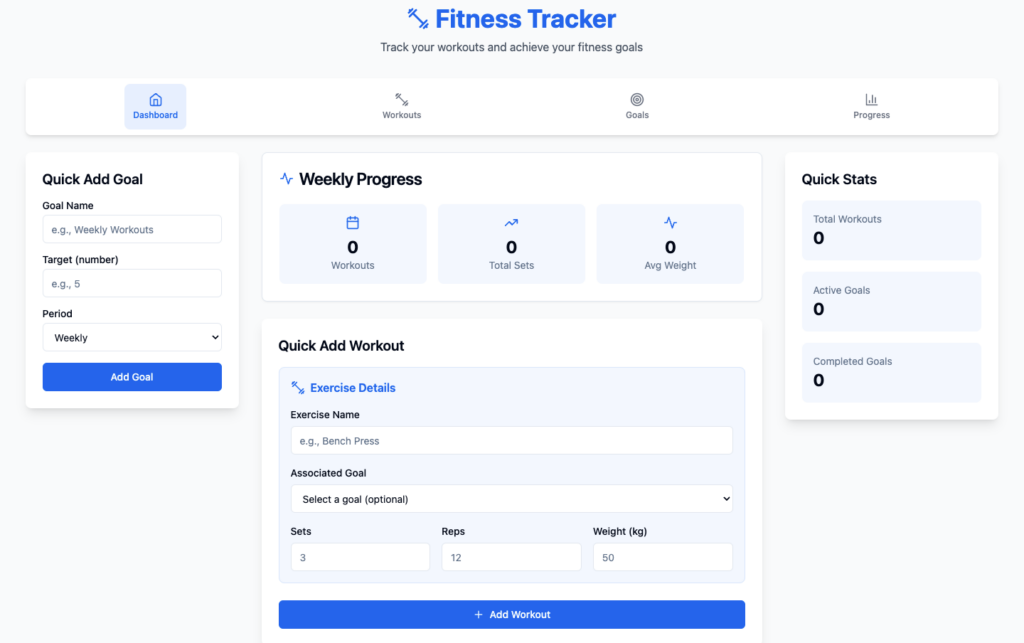
Meal planning and grocery tool
Addressing the diet aspect, this app lets users plan weekly meals based on dietary preferences and automatically generates a grocery list. Health coaches, nutritionists, and creators can monetize it by running meal plan subscriptions.
For personal use or added value, consider adding portion control, a macro tracker, and options to export or print the plan.
Online fitness challenge tracker
Gyms, influencers, and community wellness groups could use this tool to organize short-term fitness challenges, like 30-day step goals or weekly yoga streaks.
Users should be able to register, track their progress, and see how they rank on a leaderboard. Meanwhile, badges, rewards, and social sharing options help keep them motivated.
Micro SaaS for restaurants and cafes
Micro SaaS products for the food industry aim to streamline operations, improve customer experiences, and make running a business easier. They’re perfect for owners looking to reduce overhead and improve efficiency.
Recipe management and menu builder
An app for managing recipes, creating custom menus, and ensuring consistency in preparation. Restaurant owners and chefs could input ingredients, cooking instructions, and even nutritional information to make the process smoother.
You could add features like cost per dish, automatic scaling of recipes for different serving sizes, and inventory tracking to link ingredients to actual stock. Looking for inspiration? Check out our guide on creating a recipe web app using Hostinger Horizons.

Smart budget tracker
Managing finances is often harder than it looks, especially with so many variables in play. With this tool, restaurant owners can track expenses, revenue, and profit margins daily or weekly. Just input costs for ingredients, wages, and utilities to track spending versus earnings.
The tool could include budgeting features, automatic financial reports, and cash flow analysis. Include support for point-of-sale (POS) integration or the ability to generate financial reports easily.
Staff scheduling tool
A tool to help manage shifts and time-off requests ‒ ideal for cafes, small restaurants, and food trucks. Staff can schedule their shifts, request time off, and view upcoming schedules all in one place. To take it a step further, the app could send notifications for shift changes, remind employees of upcoming shifts, and track hours worked for payroll.
Additional features could include overtime calculations, tips management, and team communication options to improve organization and alignment.
Analytics software
Analytics software helps businesses track performance, monitor key metrics, and gain insights into how they’re doing. For small businesses or solopreneurs, having access to simple yet powerful analytics tools helps make better decisions without the need for a full-fledged data science team or complex (and often expensive) software.
Trend analysis tool
An app that helps business owners spot emerging trends by tracking data over time. They can track changes in sales, website traffic, customer behavior, and other key metrics to identify patterns and forecast future growth.
This tool could offer customizable filters to segment data by product, region, or customer type. Consider adding comparison features that let users measure trends against competitors or historical data. This way, businesses can make informed decisions based on real-time insights.
Heatmap analysis tool
Heatmaps are a great way to visualize how visitors interact with websites, apps, or landing pages. This tool would generate heatmaps that show where users are clicking, scrolling, or spending the most time on a page, optimizing your call-to-action placement.
Key features could include session replay, user journey tracking, and the ability to identify high-traffic areas or potential pain points in a user’s experience. The goal is to help marketers and UX designers boost user engagement and increase conversion rates.
Customer feedback and survey tool
A tool for gathering, analyzing, and presenting customer feedback in a simple interface. Users can create surveys, collect responses, and track key metrics to measure customer loyalty and satisfaction.
This software is especially useful for service-based businesses or ecommerce sites looking to improve their offerings based on direct customer insights. Consider adding real-time reporting, custom survey templates, and integrations with email platforms or CRMs for follow-up actions.
Landing page builder
Landing page builders simplify the process of creating high-converting pages without needing to manage a full website. They make it easy to build pages for promotions, lead generation, and personal branding whenever needed ‒ perfect for business owners, marketers, and even freelancers.
Virtual business card builder
A digital business card builder lets users create and share professional-looking business cards online. Professionals can input their name, job title, company info, email, phone number, and social media links. Users can also upload a profile picture and customize the design to reflect their personal or brand style.
This tool could allow users to generate a unique URL to share their card digitally via email or social media, and track who viewed it. Integration with email signatures or contact management apps would increase its value, allowing professionals to store and manage their cards in one place.
Check out our guide on creating a virtual business card to see how it’s done using Hostinger Horizons.
Did you know?
Using a custom domain for your virtual business card can boost your professional image further. Follow our tutorial to connect your Hostinger Horizons project with a custom domain.
Event registration page builder
Designed for event organizers, a tool like this allows users to create dedicated landing pages for events or webinars. Users can set up custom registration forms, offer event details, and integrate payment gateways for ticket purchases or donations.
You can add features like automated email reminders, calendar sync, and attendee management to enhance the event experience. The tool could include a simple dashboard to track signups and event performance, providing insights into attendee behavior and conversion rates.
Lead generation page builder
This tool should be able to quickly create lead capture pages with customized forms. Whether for a free consultation, email list signup, or product demo, users should be able to choose from a variety of templates and add fields to collect relevant information.
The page builder could include options for customizable CTA buttons, automated email responses, and simple integrations with CRM or email marketing software. To optimize conversions, A/B testing and heatmap tracking would be useful features.
Micro Saas for invoicing
Invoicing software is essential for businesses looking to streamline billing and get paid faster. This kind of tool offers simple, customizable solutions without the complexity and cost of traditional accounting software. Perfect for freelancers, small businesses, and service providers who want to easily manage and track invoices.
Invoice generator
This tool should offer basic invoicing functionality, enabling users to quickly create and send professional invoices. Users can input details like client information, services provided, rates, and payment terms to easily customize each invoice.
Advanced features might include recurring invoicing, payment tracking, and automated reminders for overdue invoices. Integration with payment gateways like PayPal or Stripe would allow users to accept payments directly from the invoice, further simplifying the billing process.
Time and expense tracker with invoicing
Catering to freelancers and consultants, this tool tracks billable hours and expenses, automatically generating invoices based on time and costs. Users can log detailed time entries, categorize expenses, and set hourly rates or project fees.
The tool could also generate reports to track earnings, compare estimates with actual project costs, and keep users organized. Integration with accounting software like QuickBooks or Xero would be a useful addition for more detailed financial reporting.
Here’s a basic version of a time tracker app for inspiration ‒ built using Hostinger Horizons. Create an account and try it yourself.
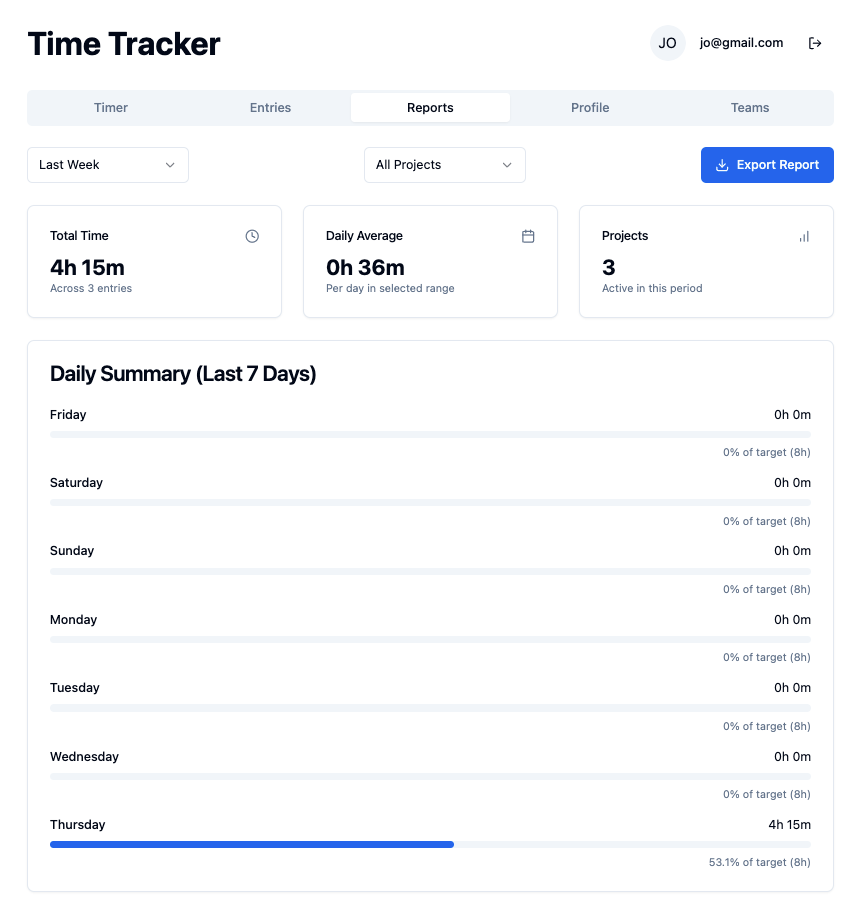
Subscription billing tool
Focuses on managing recurring payments, ideal for businesses offering subscription-based services or products. Users can set up different subscription plans, monitor billing cycles, and track customer payments over time.
Additional features could include automated invoice generation, integration with CRM tools, and the ability to send renewal reminders. For extra convenience, consider offering a client portal where customers can view their invoices, update payment details, and manage their subscriptions.
Marketing automation tools
SaaS products in this category streamline and optimize marketing efforts by automating repetitive tasks like email campaigns, social media posting, lead nurturing, and customer segmentation. They save time, increase engagement, and boost sales while cutting down work.
Email campaign automation tool
This tool helps businesses automate email campaigns based on user behavior, interests, and purchase history. Users can create segmented email lists, design templates, and schedule campaigns to send at the most effective times.
Adding A/B testing, performance tracking, and triggered emails like welcome emails and cart abandonment reminders) could increase its usability. For online businesses, consider integrating with CRMs or ecommerce platforms for better targeting.
Referral program automation
An app of this type automates rewarding customers who refer others. Users can create personalized referral links, track referrals, and issue rewards or discounts automatically when a referral is successful.
For business owners, the app can offer features to monitor the program’s success, including tiered rewards, automated follow-up emails, and detailed referral tracking. For customers, allowing them to share their personalized link via social media, email, or messaging apps makes the process even easier.
Personalized content recommendation engine
A tool that uses data to recommend personalized content to users based on their browsing behavior, purchase history, or preferences. This empowers businesses to deliver relevant content to individual users, increasing engagement.
You could offer automated content suggestions via emails, websites, or apps to cater to different customer preferences. For businesses, including links to relevant product pages could also help drive sales.
What is the most profitable micro SaaS idea?
AI-powered content creation tools are one of the most profitable micro SaaS business examples. This market is growing fast. AI content creation is expected to grow by 21.9% annually and hit $7.74 billion by 2029. That’s a huge demand for content generation tools.
Businesses across all industries ‒ whether it’s ecommerce, marketing, or education ‒ need content. With AI, they can streamline production, create content in multiple formats, and easily cater to different platforms and audiences.
AI also helps cut down production time and costs significantly, making these tools a great option for businesses looking for more efficiency. In turn, they often end up making more money with micro SaaS compared to traditional content creation methods.
By offering this as a subscription-based service, you can build a steady, scalable revenue stream. Plus, it’s flexible enough for all types of businesses, from large companies to smaller ones with limited budgets ‒ just like many profitable micro SaaS companies out there.
Did you know?
Boost your SaaS product’s success rate with the right marketing strategies. Check out our guide for web app promotion tips.
Conclusion
Looking ahead, the future of micro SaaS is bright. As businesses want to save time, reduce costs, and streamline operations, the demand for specialized, efficient software will continue to grow. No-code tools like Hostinger Horizons help meet this demand, simplifying the development process and removing barriers for those without coding experience.
If you’re thinking of diving into the micro SaaS world, the time is now. With the right idea and an understanding of market needs, you can build a profitable business that caters to a specific audience. We hope this article inspired you to jump into the trend.
So, which idea caught your attention?

